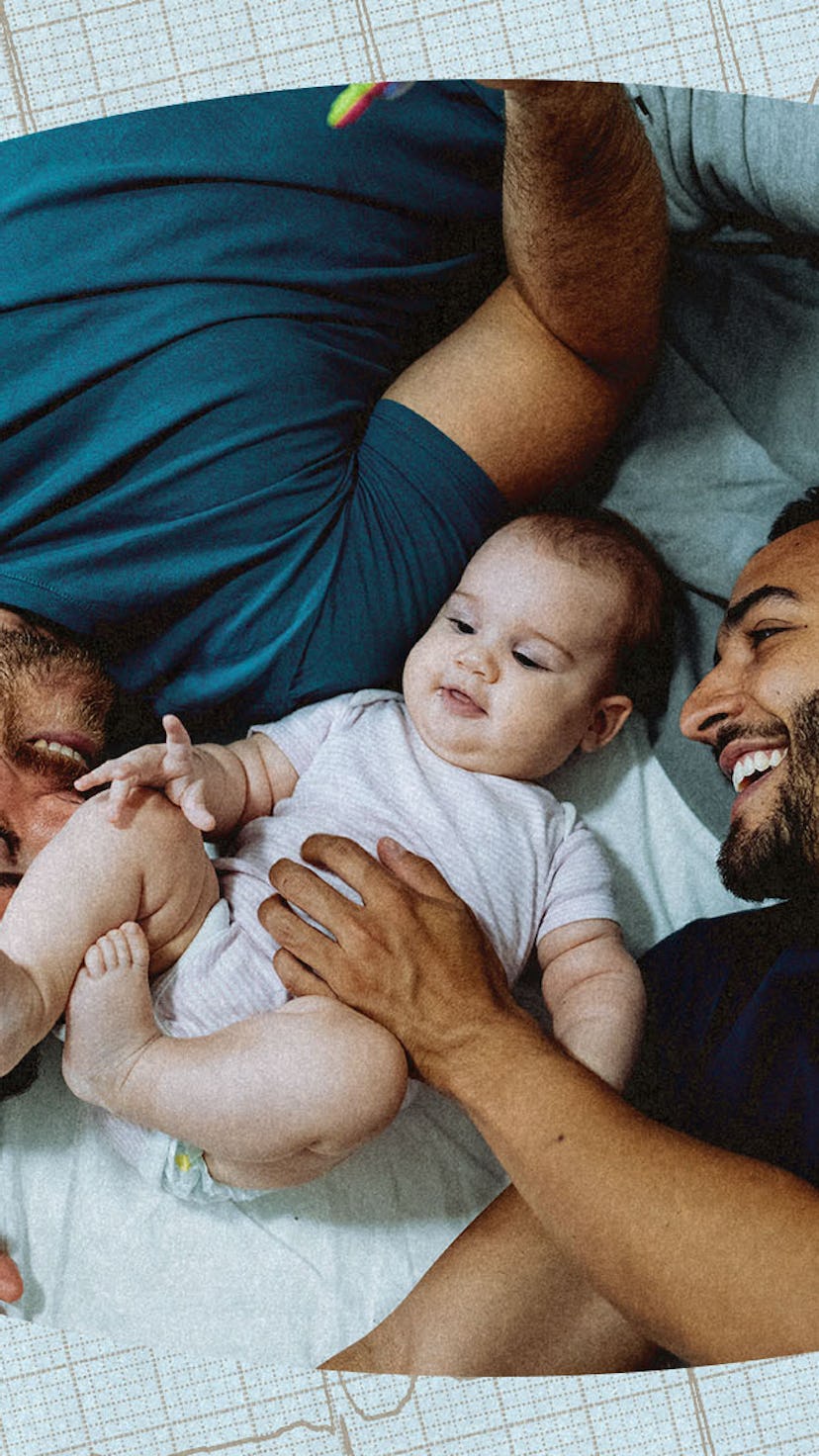Why Gay Dads So Often Raise Happier, Better-Behaved Kids
Gay dads parent better, but straight parents can learn their ways.

For years, child development research has consistently shown that kids raised by gay dads develop similarly to children raised by heterosexual parents — which is incredibly important, considering conservatives’ attempts to paint gay parents as lesser. But a new study finds that kids with gay dads may actually fare better than those with straight parents, and their approach to parenting appears to be a significant reason why.
“Research shows that children do best when raised by parental figures who use the most effective child-rearing practices — regardless of the parental figures’ genders, sexual orientations, marital statuses, or genetic relationship to the child,” says study author Robert-Jay Green, Ph.D., a distinguished professor emeritus at the California School of Professional Psychology. Knowing this, Green and his colleagues hypothesized that there would be “no significant differences” in child behavior problems between gay and straight families.
What they found proved them wrong — but only because kids raised by gay dads functioned relatively better, not just on par with their peers.
For the study, published last month in the journal Family Process, researchers surveyed 134 European families — 67 with gay dads who started families via surrogacy and 67 with straight parents who had children without reproductive assistance, matched based on their children’s ages. The research team asked questions about the kids’ psychological and behavioral issues, including anxiety, depression, social withdrawal, aggression, and rule-breaking. They also asked about couples’ parenting styles and relationship satisfaction, and if the gay families had ever encountered homophobic microaggressions (in this context, ignorant or negative comments about same-sex parents).
“Girls and boys raised in gay father families were showing better behavioral adjustment” — in other words, fewer psychological and behavioral problems — “than girls and boys raised in heterosexual parent families,” Green says. Which begs the question, is there something gay dads are doing that straight parents aren’t?
Well, yeah, and it has a lot to do with how they discipline and interact with their children.
Drawing on previous research, Green and his colleagues defined effective parenting as having an authoritative parenting style. Moms and dads who use authoritative parenting “establish clear boundaries while also being warm and responsive to their children's needs,” according to the study. And gay dads were more likely to report parenting this way compared to their straight peers.
The gay dads were relatively happier in their relationships, too. And a positive relationship between parents is thought to improve child development, the researchers note.
There was one unfortunate potential downside for children of gay dads. Kids of fathers who reported experiencing homophobic microaggressions exhibited higher rates of psychological issues compared to those whose gay dads weren’t targeted by anti-gay stigma.
Some previous research supports the idea that kids raised by two dads have better adjustment outcomes than those raised by straight parents, including that they show fewer psychological problems, break rules less, and are less aggressive. The new research adds to this growing body of multinational research, “refut[ing] concerns about possible detrimental effects on child development of surrogacy conception, or of being raised by gay fathers,” according to the study.
The results don’t mean gay dads are innately better-equipped to be parents. Rather, Green views them as further evidence that “parenting quality is the key to [children’s] well-being regardless of parents’ gender or sexual orientation.” In other words, straight parents can just as easily employ evidence-based parenting techniques to raise happier, more well-adjusted kids. Gay dads just may be more likely to.
Situational factors may have influenced the findings, too. To state the obvious: Surrogacy is expensive and time-consuming. Children born via surrogacy are always planned and wanted by parents who have the resources to provide for them, which might not be the case for those born to straight couples without reproductive assistance, the researchers note.
That’s especially true in Europe, where the study participants lived. Many European nations have stringent surrogacy restrictions, all but forcing gay couples who want to have children to obtain fertility services abroad. (In the United States, surrogacy is legal but unregulated federally; regulations vary by state.) Yet surrogacy bans — which disproportionately impact LGBTQ+ parents, often by design — have no scientific basis. The policy implications of the study are clear, Green says: Gay fathers should be granted “full and equal” access to surrogacy and adoption services.
So, what can parents take away from the study? Per Green, “our results suggest that, like gay fathers, heterosexual parents would benefit from engaging in more positive co-parenting…and using a more authoritative parenting style.”
In practical terms, if you’re raising your child with a partner, approach parenting as a team. Try to divide everyday household and parenting tasks as equitably as possible. Be warm and receptive with your child, but don’t let bad behavior slide — which would slip into a permissive parenting style. Encourage the kids to take responsibility for their actions, and consistently enforce your family’s rules — but don’t rule with an iron first, or else you could be edging away from an authoritative parenting style and into an authoritarian one.
This article was originally published on